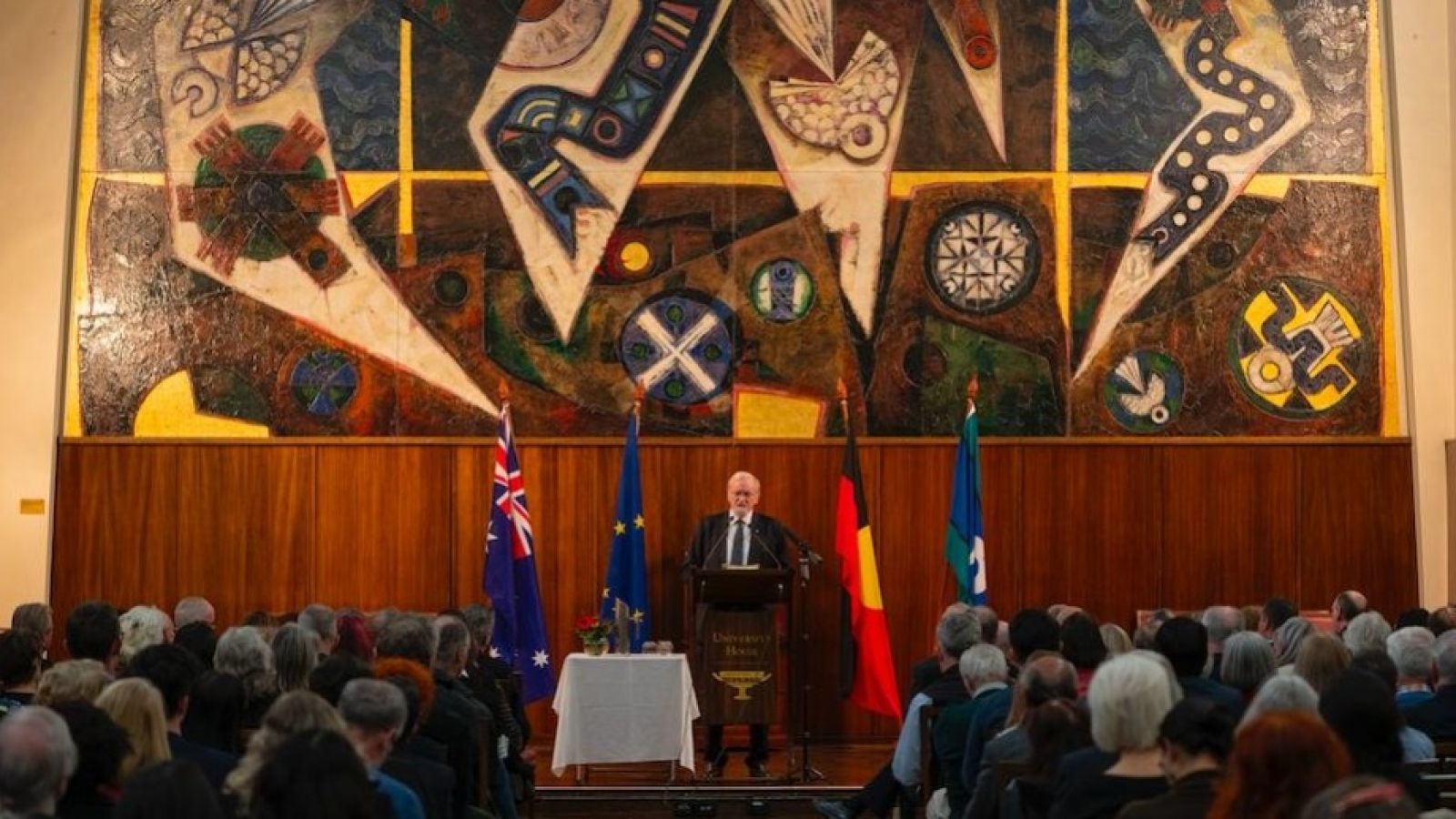Gareth Evans Delivers 2019 Schuman Lecture

At a time of political tension surrounding the approaching Brexit deadline, retiring ANU Chancellor and former Foreign Minister Gareth Evans has reflected on a deep personal attachment to Europe and the ideal of European unity, delivering the 2019 Schuman Lecture at ANU.
In the lecture titled “Europe at the Crossroads: Global Power or Also-Ran?”, Professor Evans described the formation of the European Union as the single most important conflict prevention enterprise the world has ever seen. The European Union and idea of European unity was driven not only by economic reasons, but by geopolitical intent, binding countries together that had previously fought with one another, with tragic consequences of unprecedented scale through the 20th century.
It was Robert Schuman for whom the annual lecture pays tribute, who helped set Europe on a path to unity by proposing French and German coal and steel production be placed under a central authority in May 1950.
“The story of the evolution of Schuman’s dream of European unity was, for at least the next 55 years, overwhelmingly a success story,” Evans said. “Albeit one with many bumps and stumbles along the way, like the economic fallout from the 1970s oil crises, the less than stellar handling of the Balkans political crises of the 1990s, and recurring tensions over the management of the enlargement process.”
Evans was realistic about the progress made and challenges ahead for Europe.
“A number of the key assumptions which the EU has traditionally made about itself have shown serious signs of unravelling. Its leaders are now confronting an unprecedentedly complex and often interrelated set of economic, security, social and political challenges, all of which have significant implications for both Europe’s capacity to meet the needs and aspirations of its own citizens and, at the global level, to punch at the weight it could and should.”
This challenges include the economic, demonstrated fundamentally by the disconnect between supranational monetary policy and individual fiscal policies within countries.
Security challenges include a very different US administration outlook on US and foreign engagement, and difficulties in NATO members states bringing their defence investment up to expenditure targets.
Social challenges include the surge in refugee movements, ongoing challenges of conflicts on the border of Europe and risk posed by Russia.
And finally political challenges, not so much as feared by the rise of far-right elements, but rather the fragmentation of voters and greater difficulty in traditional centre parties being able to achieve stable government. Most acute is the Brexit result on the United Kingdom, and subsequent political fallout that saw major parties lose voting share.
Evans outlines four ways in which Europe must proceed if it is to face these challenges effectively, and emerge as an influential in a new global landscape alongside the United States and China. These including the absolutely necessary need to find effective political leadership and to refocus on multilateralism and cooperative solution. The EU must also recognise there is a difference between those states who desire something like a full federal system, and those, the majority, that favour retaining national sovereignty within an economic union. And finally Europe must remember the past and the lessons from it, if it is to avoid marginalisation, or worse, becoming a theatre for interstate conflict again.
“If Europe is to meet the present array of challenges that presently beset it, and not become a divided, marginalised bit player on the world stage – or, even worse, to become itself once again a theatre for deadly conflict – that Europeans remember the past. And that they remember, or learn all over again if they cannot remember, why Robert Schuman set the whole European Union enterprise in train seven decades ago.”
The annual Schuman Lecture is presented by the ANU Centre for European Studies, supported by the Erasmus+ Programme of the European Union. Since 1996 the lecture has recognise the achievements of European integration, set in motion by French Foreign Minister Robert Schuman’s declaration of the European Coal and Steel Community in 1951. His Excellency Dr Michael Pulch, Ambassador of the European Union to Australia, offered the Vote of Thanks for this year’s lecture.
The full text of the lecture is available here.
The video of the lecture is available on ANU TV.